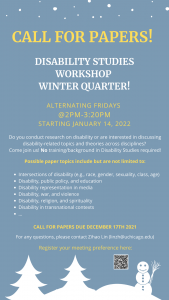Please join us for a special guest presentation this Friday, February 24th! As noted in my last email, Mine Egbatan has had to cancel her presentation due to the earthquake in Turkey, and we keep her in our thoughts during this time. However, we are excited and grateful for Elizabeth and Alice to step in and present for us!
Emily Williams
—
Gorgons and Gatekeeping: Cognitive Access Tools for Inclusive Tabletop Roleplaying Games
Elizabeth McLain and Alice Rogers
Friday, February 24th, 3:30pm – Rosenwald 329
Refreshments will be provided
Abstract: During the pandemic, our disability community in Southwest Virginia began using inclusive gaming to remain connected when we needed to maintain social distancing. Meanwhile, interest in tabletop roleplaying games (TTRPGs) skyrocketed, especially Dungeons and Dragons Fifth Edition (DnD 5e). Several of our community members wanted to play DnD together, but some struggled to fully access and enjoy the game due to cognitive barriers. Memory, attention, interaction, and decision-making support can be helpful to players, including those with ADHD, autism, chemo brain, and increasingly common neurological manifestations of long COVID. Empowered by grant funding, our team of disabled investigators, collaborators, playtesters, and their allies is developing open access tools to support disabled players and unlock the community-building potential of DnD. Our first project features interactive character creators, one-page player decision guides, and spell cards. To ensure everyone can play, our tools use Fifth Edition materials available through the Open Gaming License, which allows creators outside of Wizards of the Coast to develop content for DnD.
Our presentation and interactive demonstration will focus on the process of designing with neurodivergent and disabled DnD players, the experience of using the tools, and how we plan to expand on them in the future.
Bios
Alice Rogers (MA Ethnomusicology, University of Maryland) is Manager of Studios Media and Lending Services at the Virginia Tech University Libraries. She is a member of the Virginia Tech Accessible Gaming Research Initiative. Her work includes technology education and the support of multimedia projects, with a focus on improving access to technology by producing additional documentation, providing in-person and online workshops, and selecting easy-to-use equipment as a first priority. Under her supervision, the Studios Technology Lending Desk has expanded its holdings of accessible technology and gaming equipment, including a collection of over 60 board and tabletop games. During the COVID-19 pandemic, she oversaw the creation of the library’s Twitch channel and programming on tabletop gaming and literature education, and supported the transition from in-person gaming events to online spaces, for which her team was given a Library Diversity Award.
Elizabeth McLain (PhD. Musicology, University of Michigan) is an Instructor of Musicology and the interim co-director of the Disability Studies minor at Virginia Tech. As a transdisciplinary scholar, she maintains two active research specialties. Her work on music and spirituality since 1870 confronts assumptions about secularization by deciphering the spiritual and religious references in modernist and postmodernist musical compositions, as seen in the Journal of Musicological Research, her dissertation, and her contributions to Messiaen in Context and Mystic Modern: The Music, Thought, and Legacy of Charles Tournemire. McLain’s lived experience as a chronically ill cane-wielding autistic compels her to transform music scholarship through the principles of disability justice. She serves as co-chair of the Music and Disability Study Group of the American Musicological Society and is a professional member of RAMPD: Recording Artists and Music Professionals with Disabilities. By connecting disabled-run advocacy organizations, McLain combats ableism in academia with communities of care. Her research on disability culture and the arts has an (auto)ethnographic bent, capturing an insider’s perspective on the creative lives of disabled artists. With the support of an ACLS Digital Justice Seed Grant, her a2ru’s Ground Works team is documenting the inaugural CripTech incubator with an emphasis on ethical consent processes and access. She is also excited to be co-founding and co-directing the Disability Community Technology Center at Virginia Tech with Ashley Shew thanks to a generous grant from the Mellon Foundation. Her current book project is Krip Time: the Rhythm of Disabled Music, Life, and Activism.
Rogers and McLain’s accessible gaming project is supported by a Collaborative Research Grant from Virginia Tech Libraries (“Disability Community Building with Cognitively Accessible Tools for Tabletop Roleplaying Games” with Kayla B. McNabb) and the Mellon Foundation Higher Learning Program (“Just Disability Tech Futures” with Ashley Shew, Damien Williams, Andrea Pitts, and Tyechia Thompson).
